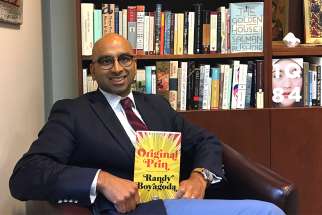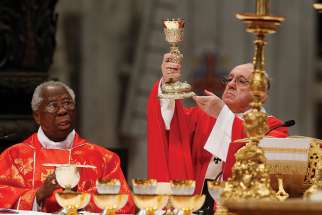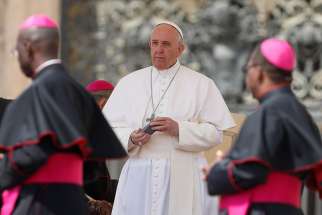An alumna of our Newman House chaplaincy at Queen’s University offers an inspiring model of reading — of actual books.
Sacraments are gifts, not for sale, Pope says at Mass
Pope Francis has reminded believers that Jesus' love is infinite and true, unlike worldly passions that seek power and vanity.
Gifts in kind are sometimes not so kind
Grandpa’s stamp collection, your first car, a box of beat up old coins, a comic collection from the 1980s, crystal figurines in a living room glass display, a really old pocket watch and great Aunt Betsy’s tarnished tea set all have one thing in common…
The owners usually believe their items are worth more than they really are.
Chances are we have all imagined having the “big win” that we occasionally see on TV shows like Antiques Road Show. Especially when we have invested time into collecting something we care about. We naturally think that others will recognize the same value we place in it.
One gift I especially remember handling for the archdiocese of Toronto was from a parishioner who was gifting to their parish a mid-1990s Jaguar. The car was beautiful. It really was. It had only 74,000 kms, was driven in the summer and for the most part was stored indoors for the winter. The person donating it was the first owner. The car had never been in an accident and the interior was immaculate. The donor was in his late 70s, had all the servicing records and took really good care of it. He had moved into a condo downtown and no longer wanted to drive.
For various reasons we had to sell the vehicle to a dealer. We got $3,500. And while the donor did not mind (he knew well in advance), I must admit that if it were not for that pesky little thing called “a conflict of interest,” I would have bought the car.
The best part of the transaction was when the dealer who was buying the Jaguar told me to call him right away if I ever got a hold of a mid-1990s Volkswagen Jetta that ran on diesel. It seems construction people really like them because the same diesel that goes into the equipment can go into the car. We could expect to fetch a few thousand more for the Jetta than what we got for the Jaguar.
It can be a hard, cold world.
Another interesting gift was a collection of old stamps. There were two big books of them. They looked very old and really valuable. Using a contact in the numismatics and stamp collecting world, we were able get the collection into an auction. The collection fetched less than $500. The dealer who facilitated the sale told me that if we ever got a hold of some Chinese stamps that depicted the Cultural Revolution to give him a call as they are “hot.” It seems there are some wealthy Chinese business persons who like to use stamps to diversify their wealth.
The key to valuating a donation for gift in kind purposes is not what we believe the item is worth, or even what an insurance appraisal says it’s worth, but what the item is worth in a free and open fair market. The Canada Revenue Agency sets a guideline surrounding this. If a gift in kind is made, either in life or through a Will, the tax receipt will be for the fair market value. A good example is a diamond ring. While there may be an appraisal for insurance purposes that says it’s worth $10,000, if potential buyers on a free and open market are only willing to pay $5,700, then the tax receipt will be for $5,700. This is the fair market value.
There is a way that you can check to see what your gift in kind may be worth for receipting purposes. Try going onto ebay.ca or Kijiji.ca and watch an online auction to see what it (or a very similar item) sells for. Do this a few times, average the amount, and then you will have a pretty good idea as to what you can expect your tax receipt to be.
If you don’t like what you see (or do like what you see) consider keeping the item in your family. An old Coke machine in the basement or a well-framed Olympic pin collection may look better in a family members’ basement than a tax receipt for a few hundred dollars.
But who knows? Perhaps you do have the special item that is one of a kind. I once handled a painting that sold in auction in London, England, for more than $100,000. I knew we were on to something when three people showed up to see the painting with white gloves and an ultraviolet light.
One never knows!
(Schesnuik is the Manager of Planned Giving and Personal Gifts for the Development Office of the Archdiocese of Toronto.)





